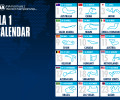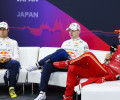F1 - USA GP: Conference 2

TEAM REPRESENTATIVES – Cyril ABITEBOUL (Caterham), Norbert HAUG (Mercedes), Eric BOULLIER (Lotus), Martin WHITMARSH (McLaren), Christian HORNER (Red Bull Racing), Stefano DOMENICALI (Ferrari)
A question, first of all, to all of you: your overall impressions of the circuit and the challenge. What have you found? What do you think of it?
Cyril ABITEBOUL: First of all, it’s great to back in the US. It’s a great market, a great market for the sport, for motorsport. A great market also for the automotive business. Looking at the track, well, it looks challenging. It looks great in terms of the layout. It looks like, also, it’s quite icy, both in the air but also on the track – quite slippery. So it will be interesting. Obviously, it was not easy to do a lot of work today, as we need for the track to stabilise, so that we are able to see the impact of our settings and our change to the set-up and distinguish that from the evolution of the track. Not so tricky but really interesting, truly, from inside and hopefully from outside also.
Norbert, I'll ask you about the market in general, the importance of F1 here later, but just the circuit for the moment and how Mercedes have found it?
Norbert HAUG: Well, I think the circuit is fantastic and congratulations to the organisers, to Bernie. To get this event on the calendar is fantastic. The US is so important for Formula One. A race here belongs to a world championship, a true world championship. We have been here before and after a five-year break we are back again. The circuit is very, very demanding, very challenging. The track is developing currently, getting better and better, more rubber on the asphalt. But I think it has huge, huge potential. I think it will be televised worldwide of course, like usual, and make a big impact. So, this is a race with enormous potential and kind of a milestone in Formula One’s history I would say.
Eric?
Eric BOULLIER: Well, I’ll just follow my colleagues. Congratulations to the organiser, the promoter, who put this amazing track in place and constructed it. Thanks for Bernie for bringing us here. Obviously, as everybody says, America is important for everybody. I think it’s quite an impressive track with a different, you know, layout. I think we could see today, obviously, the track evolution was huge. The drivers found it challenging, so that’s promising for the race.
Martin, the challenges of the circuit in particular? And what is it about Turn 19. Has anyone explained to maybe the front row here what it is about Turn 19 that everyone seems to be going off there?
Martikn WHITMARSH: It’s an enormously challenging circuit. I think we can all be a little bit repetitive in these responses but again, I think we have to congratulate everyone, Bernie and the organisers, for putting together not only a great circuit with great facilities and also it’s great to see how many people were here on a Friday. So we’ve got to make sure that as Formula One as a whole, we put on a show this weekend; that we reach out over the coming year and we build this into a fantastic event. Clearly, the foundations are here to be able to provide that. I think it’s for us now to work as hard as we can to create the interest here. As far as the track is concerned, there are a lot of different corners on this circuit. I think [Hermann] Tilke has brought an assembly of corners from the other circuits he has built and tried everything here. The topography is great and there’s something about hills and dips and blind corners that make it very challenging for drivers but also make it look great and spectacular to drive on. But I think today, as has been said, the circuit seemed very shiny. I think it’s exacerbated by a reasonably conservative tyre choice here. So, I think we’re going to have to work hard, certainly we know we’ve got to work hard on low fuel; we found it a little bit easier on high fuel, which suggests we weren’t working the tyres well enough on low fuel. Some of the corners have got some unusual camber, which just makes it an interesting challenge. I think it’s slippery, some interesting cambers on the circuit and some interesting compromises you’ve got to try and find between the vast variety of corners we have.
Christian, do you think it suits the Red Bulls?
Christian HORNER: Yeah, it’s been a good day mainly for us today. Again, it’s incredible to see what’s been done in the last 18 months. We came here 18 months ago when it really was just a construction site and we ran a car with David Coulthard on just dirt and rubble that existed here. And to see what’s happened and how the track’s been built and the undulations and the corners, the way it’s been incorporated – just hats off to the Circuit of the Americas and to Bernie for convincing them to take up this race and so on. It’s a great challenge and a great spectacle and hopefully we can put on a good show for the American fans and public and it will be a race to remember.
Stefano, good for Ferrari?
Stefano DOMENICALI: First of all, just to start in a different way: happy birthday to Christian, he’s getting older but with good results. No, I would say that everything has been said. For us, I don’t know. We are there. Today, it’s difficult to judge the performance because you never know the first day as we said with such a new track. But for me, the most important thing with regard to your question Bob, is that I’m sure it will be a great show for the Americans, because we need that in order to make sure that this is the first day of a long term days when we speak every day about Formula One. For me the most important thing from let’s say now, from this weekend onward, is really to make sure that our American friends speak about Formula One every day. In order to build up what is Formula One is all about. I think that being here in this condition, helped by what Martin was saying about the tyres, makes very spectacular situation for everyone to… and I’m sure that will be the case on Sunday.
Thank you very much. Again, to all of you: the importance of a race in America for your sponsors. Perhaps you can talk about that. Different priorities for different people obviously. What does it mean for Caterham and for your sponsors, GE for example?
CA: For Caterham as an automotive company this is crucial. Obviously our current product range is not particularly adapted for the US but it’s still important for the future. The US is important because, for instance, car sales, car registrations in the US has picked up at the same level almost from what they were before the crisis. In comparison to what’s still happening in Europe, to the slowdown in some other markets like South America, North America and the US in particular is now back to a level where it was before. It is important for automotive companies, which are supporting mainly our show and Formula One in general. For Caterham more specifically, yeah, obviously we’ve got those links with GE, with Dell, with Intel. We've got a lot of people here. That’s important because those companies are used to other sports properties, like Olympics, like basketball, like a lot of things. There are different approaches to sports between the US and Europe but I don’t think it’s for here to discuss and debate about the merits of the difference, but I think it will be interesting to see how we make a good impression and also make sure that we are sustainable like Stefano was saying just before.
Norbert?
NH: Well for us this is obviously very, very important. It is the biggest market of Mercedes-Benz passenger cars worldwide. We are very successful here and still growing year-by-year. We have a production plant in Tuscaloosa obviously, building 130,00 cars here: M-Classes, ML, GL, the R-Class, and C-Class will be built here later on in Tuscaloosa and Arizona, so it’s a very, very important… you can say the most important market of course. And we will use that in the future, this event, and we will integrate it, our American colleagues will integrate it into their marketing strategies. That’s absolutely perfect and again, thanks for the guys here for having invested in these great facilities and thanks to Bernie to bring America back, thanks to the teams, that we all wanted to go in that direction and I think this is really a very, very important step for Formula One.
Eric?
EB: First from a team point of view, on my shirt you can see I have American companies like Unilever and Microsoft and Avanade and obviously a lot of technical partners as well are coming from America so it’s obviously very important for us to be here. I could see yesterday on my way coming here, I met a lot of fans in the airport and I was quite surprised to see all these American fans; they are very hungry to see Formula One, to be close to Formula One and I think all of the figures here are just talking for themselves because it’s sold out since a long time. I think a lot of teams here have hospitality, corporate hospitality, full of people – so there is a great interest in Formula One and in this race particularly. I think it’s good for Formula One to be back here, yes definitely. Any team here will justify that we need America in Formula One and Formula One needs to be here.
Martin?
MW: I think in summary, the USA is just a huge consumer market and I think you’ve only got to walk up and down the paddock here, see the names and all the brands that fortunately invest in Formula One and allow us to go Formula One racing. Nearly all of those brands if you look at them, the USA must be in the top three of their markets around the world. So it’s fundamentally important to the brands that invest and fund Formula One. This is really the country of the automobile and we’ve never come here and done a good enough job to create the interest. We’ve got a very different product from NASCAR. Obviously NASCAR reaches an exciting finale this weekend, which is an unfortunate coincidence, but I think we’ve got to work very hard to be as commercially smart as NASCAR and compete. I think we’ve got a different product, an exciting product and again, we’ve got to work very, very hard to make sure we sell it in America in a way that we haven’t done in the past.
Christian?
CH: It’s crucial for Formula One. To be a true world championship you’ve got to have a race in America. And for the first time ever we’ve got a circuit that’s specifically made to bring out the best and showcase Formula One cars. And I think the circuit that’s been built here will do exactly that. Hopefully we can put a great show on for the fans. In some ways it’s surprising for us to see how much interest there is in the US, how much knowledge about Formula One, how the town has come alive with Formula One coming into Texas. I think it’s a crucial race for Red Bull. America is Red Bull’s biggest market and certainly for our partners as well. Infiniti sell more cars here than anywhere else in the world and partners like AT&T… it’s an important market for us, it’s our biggest-ever race from a hospitality and guest point of view in our short history, so it’s a great place to be coming back into the US and hopefully we can have a great race on Sunday.
SD: For us it’s the same. It’s the biggest market for Ferrari. It’s a very important market for our group with the brand of Chrysler and Fiat Cinquecento so it’s something that for sure… and as you can see we have a Ferrari Challenge series running during this weekend because we have a lot of clients, a lot of customers and as we all said, it really is imperative to stay here for a long time and to consider it as a starting point for something. We have the duty to, let’s say, teach to the American approach on the sport something different, and we need to make sure that with everything, we are able to convince this market, also from the sporting point of view, that Formula One is the future. And that has to added to the American sport that are very important, for sure.
QUESTIONS FROM THE FLOOR.
(Tom Richter - TV Nova) I have a question for Stefano and Christian. Obviously this is a great event but we have the championship situation: two races to go, if you can please describe the moods in your respective teams and what prospects you see for the remaining two races.
CH: You want to go first?
SD: I have no problem, on that I should be quicker! For sure we know it is a difficult situation because we are behind but as I said to my people there is nothing to lose apart from doing the best job that we can and at the end of the day we will see where we will land. But we know we have a Sebastian that is very strong with a fantastic car and we need to make sure that we provide to Fernando the best car that we can and doing the best job that we can on the track. We have seen in the past that everything can happen so we need to believe on this up to the end. As we always said, the numbers will be done at the end.
CH: Our approach is to treat this race very much like any other. We’ve come here to try to get the best out of the weekend. To try to get the best out of ourselves as a team and the championships will then hopefully look after themselves. We’ve worked hard to get ourselves into a strong position in the Constructors’ Championship and obviously Sebastian has done a tremendous job to haul himself back into the Drivers’ Championship after the summer break – we were close to 40 points behind Fernando. With 50 points still available in the Drivers’ Championship, you can take nothing for granted. We’ve seen how quickly things can change. We know that Fernando is a formidable competitor and Ferrari as a team. We’ve just got to focus on ourselves and look to get the best out of our package here this weekend.
(Kate Walker – Girl Racer) Charlie spoke to us yesterday about the prospect of adding points to super licenses instead of or in addition to the existing reprimand system. Could I please have your thoughts on whether you think offences both driving and non-driving should be treated on a points scale.
SD: I don’t know what Charlie said yesterday, to be honest.
CH: Charlie said there’s going to be points on your license now – is that it? Right, 12 points…
SD: Team principle included…
CH: I’ve got nine so… Martin, I’m surprised you’ve still got a license…
MW: I haven’t always. I think at the moment you’re meant to receive three reprimands and then you get something so I think it’s just presumably a further elaboration on that point. Like all things, any penalty system, providing it’s administered in a correct, consistent manner then why should we have any problem with it? It’s the same for all drivers and the same for all teams.
Q: (Julien Febreau - L'Equipe) To all of you: regarding this season, in what way has Sebastian Vettel impressed you the most and do you think that now Sebastian is a better driver than in previous seasons?
CH: Sebastian is a remarkable young man. He's continued to evolve as a driver and as a person. He's never given up this year. He's driven with great determination. It's been a tough year for him and the team, but he's fought hard to get himself back into this championship and he's driven extremely well. It's a halcyon period for Formula One at the moment; there are some formidable drivers on the grid at the moment. Any driver, either Fernando or Sebastian, if they prevail in this year's championship they will be fully deserving of that title. I think he's continued as an individual to evolve. It's only his hundredth Grand Prix this weekend and to have won 26 of those races, to have had more than 30 pole positions, to be a double World Champion at the age of 25 is something quite remarkable. But he carries that extremely well. I think he's a good ambassador for the sport He applies himself in an extremely focused way to the job in hand. That's my summary.
MW: Well again, I think none of us were as qualified as Christian to answer this one really, but I think what you can say is that if you contrast this with last year... then Sebastian had an incredible start to the season and had great momentum and I guess you've got to say that it's impressive how he's come back this year and fought back into the position that he's in. Obviously the team's done a good job as well, but I think it's been a more difficult year for him to get into a championship-winning position than he's experienced before and you've got to give a lot of credit to him and to the team for being able to do that, so he's done a good job. He's learned some more languages as well, hasn't he?
CH: Yes! From the mechanics!
CA: Maybe I can just say a word, because I've lived a part of the season at Renault and as Renault obviously Sebastian is one of our customers. Obviously there's been a couple of failures that he's had to live with and I think that he's shown - even at the difficult moments - he's shown a great respect for everyone and all the parties involved, and I think that as such he has demonstrated his stature that he's clearly a grown-up.
EB: Just a quick one but that basically as a pure driver he's keeping developing his speed and getting more mature, definitely, more consistent and can bounce back from any difficult situation and take any opportunity so definitely you can see him growing even higher as a World Champion and future World Champion..
Q: (Sarah Holt - CNN.com world sport) I just wondered, Stefano, if you'd like to state the case for Fernando, who's also had a brilliant season, because he's not had the fastest car, so I just thought that in contrast to the Seb stuff it might be nice...?
SD: Well, I think that Fernando this year has, up to now, done an incredible season, maybe the best, up to now, considering above all the starting point that we had at the beginning of the season with the car. Without maybe something not connected to any kind of his fault, maybe the position in the championship would have been different at this stage. But that's the way it is, so we need to start from that, but for sure, Fernando's season, in terms of maturity, in terms of driving, is really - I would say - incredible and I rate this season so far, honestly, as one of the best of his career, considering the situation that he was in together with the team, at the beginning, above all.
Q: (Sarah Holt - CNN.com world sport) Regardless of what happens in the championship this year, it's really difficult to judge whether Seb or Fernando is the better driver of the two unless they're in the same machinery, I suppose.
SD: We can do a Ferrari challenge because we have all the cars here, but that is part of Formula One. For sure drivers can make the difference but alone cannot really win. It's a matter of teamwork, it's a matter of a good performing car, a reliable car, good teamwork during the race in terms of strategy, good pit stops. It's all about this. This is really the best thing about Formula One I would say.
Q: (Ralf Bach – R&B) Martin, why do you think Lewis will regret his move to Mercedes next year?
MW: Well again, as in a lot of journalistic quotes, they're not always wholly accurate and not always completely in context but I think the question I was asked was 'would I or would he regret...' and I said 'well both of us might do,' but again, I don't think any of us can look forward and predict with absolute certainty what's going to happen. At the moment, we're focused on racing the last two races and we'll focus on that, try and do a good job. I'm sure Lewis will do a great job next year driving a Mercedes.
Q: (Eddy Javier Tobias Carrillo – Wise Racng) I want to ask any of you about the tyre challenge this weekend. Mr Martin (Whitmarsh) mentioned that the tyre (selection) was probably a conservative choice for this weekend from Pirelli. I wanted to ask how do you compare that with the braking zones, because the braking zones are very hard? I saw many drivers locking up in the braking zones. Is that helpful or not? How are you going to cope with that? And how many stops do you think you will be doing?
EB: On paper, we could say maybe a conservative choice but it's normal for Pirelli as well. It's a new track, new tarmac so no racing before so everything has to be built up. We could see a lot of track evolution over these two days, during the two sessions, so that obviously has to be taken into consideration for the rest of the weekend, especially for qualifying and the race. Actually our engineers are still analysing with Pirelli the wear and the degradation and these kind of parameters, so at the end, I think it's just a choice which was done and we have to deal with it and we cannot complain or do anything.
NH: We have to have an understanding for Pirelli in this case. Of course it's easy to say if you would have brought softer tyres but I think they just didn't have enough data about the circuit so they didn't exactly know how challenging this track would be so they went on the safe side and I think that's understandable.
MW: We probably felt happier about the tyres here than we did when we were in Indianapolis a few years ago, so conservative is not such a bad thing.
Q: (Kate Walker - Girl Racer) Martin, you said earlier that it's a shame that the race this weekend coincides with the NASCAR Sprint Cup finale. On the provisional calendar for next year, it also conflicts with the NASCAR Sprint Cup finale and I was wondering if any of you had plans to object or get the calendar modified so that we actually could break America properly?
MW: Again, I don't know about the others, but we're not involved in setting the calendar. I think it appears to be a bit unfortunate but we're probably (involved in) a different market and I guess it's difficult when you're arranging calendars to always get them... there's always another sporting event in most nations that you try to dodge around. I don't know how significant it is. As I say, this is a new market for us but it's obviously something that occurs. NASCAR draws a huge huge audience, both in attendance and in television so we've given ourselves a bit of a challenge there, I think. I wasn't aware of the clash next year.
Q: (Kate Walker - Girl Racer) Speed are giving the NASCAR finale 30 hours of TV coverage this weekend. I think F1 is getting something like two and a half, so it is a bit of a problem for the dedicated motor sport fan.
CH: I think the major problem is that whatever weekend you stick a Formula One race on there's going to be a NACAR race. Looking at their calendar, they seem to race every single weekend. Some of us think that 20 races is a lot. I think that those guys are doing a fair bit more.
SD: To be honest I have to say that I didn't know about that. I think that, for sure, in terms of quantity, there's not even a fight because it is impossible to fight in that respect. As I said at the beginning, we take this momentum to speak about Formula One because I don't think it's only a matter of having on one hand the main final and on the other hand one race in America but also it's a matter of growing the attention of Formula One and then maybe in the future, the hope is that if you have on the same day the two different events, we have it the other way around, meaning that we have done a great job in terms of promotion. That should really be our target at the moment.
Q: (Maurice Hamilton - Honorary) Formula One has arguably never been more competitive from the front of the grid to the back so driver talent is therefore the most important thing that you're looking for. We know that drivers with financial backing still play a part, certainly in the second half of the grid, the back half of the grid. I wonder if the front three can just give me their view on that and say if that's still an inevitable part of Formula One, despite the need to cut costs and perhaps Cyril could explain how important a driver with financial backing is to one of the smaller teams?
CH: Well, I think that since Formula One started in 1950, there has always been a mixture of drivers that have paid for seats and drivers that have been paid as professionals. The demands and costs of Grand Prix racing have always required that and it's no different today where there's drivers that have perhaps were associated with sponsors but have still had to demonstrate their talent, demonstrate their ability to warrant a place. In a perfect scenario, you'd have the top 24 drivers on the grid that were the most talented 24 drivers in the world in a Formula One event. The reality is that isn't the case and I think that while Formula One is a commercial business and there are commercial pressures, I think you will always have that balance, but I think that what's good to see is that there have been schemes that have been set up to support young drivers who have found their way onto the grid that perhaps were associated with sponsorship but have also had to earn that position.
SD: I agree what Christian said but one point to add: the less chances that we give to drivers to test on the track, the more it's likely that we have drivers than can present themselves to a team with whatever you call it, with money to bring with them, and this is why we are so keen to have some more testing, also for them to make sure that they are able to show to everyone how good they are on the track, on top of how good they are in bringing money to the team.
MW: I think there are some good pay drivers out there at the moment but to my mind, there are probably too many teams that have to rely upon pay drivers and I think that's a little bit sad for the sport and I think it's an indication that we've got too much financial pressure in the sport at the moment. I think you'll always have a few but I think too great a proportion of the grid, in my opinion, has to rely upon that and that just tells us that we've got to work harder to bring costs down in the sport, because it does distort... unfortunately the three teams at the front here certainly have to pay their drivers but I think we need to really improve the financial health of the sport, such that there's a smaller proportion of pay drivers, in my personal opinion.
CA: The point that Martin was making is very true about the world economics and I think that it's a little bit more complex than that, actually. I don't like the notion of pay driver because I see them more as a commercial element which obviously is crucial when you are at the back of the grid, you don't attract the sort of TV coverage that the other teams attract and that's a reality. We are not complaining. We have to make our way through the grid, up to the (front of) the grid to get more coverage but before that happens, obviously the drivers are as ambassadors, a good commercial vehicle who have a value for any form of sponsors. Just talking in terms of contracts, usually we don't have any drivers who are paying for a seat, actually. It's just that he's introducing some sponsors to us who are helping the team to finance the season and financing their salaries, so actually in reality, there are no paying drivers as such. I don't want to start a polemic but even the best drivers in the world which are in the first row teams, there are some sponsors who are there also because they are there and I don't think you will qualify any of those drivers as pay drivers.
Q: (Carlos Jalife - Fast Mag) I was talking to Mr Ecclestone yesterday asking about the Mexican Grand Prix and he said that it's hard because Texas has set a new standard. He said that no other country can run a Grand Prix if it has a facility that is less than this one that we see here in Texas. According to the world economic climate I would disagree but I would like to have your opinion on that.
NH: It would be nice if all the Grand Prix race tracks in the future would have a comparable standard to these facilities here, especially the race track is fantastic, the layout is great. It would be nice. I have some doubts whether this standard will be guaranteed for all the race tracks in the future. It does not necessarily need to be the case in my view.
EB: It's not easy to comment on Bernie's ideas, Bernie's comments, but as Norbert just said, it's great for all of us, also for you journalists, to have these kind of facilities, to do all our work in nice conditions, for the mechanics, the engineers and everybody so yes, the standard is good and obviously we would be happy to have the same standard and again, I would be happy to race in Mexico. I've been racing in Mexico in the past and it's a different standard but still we can manage.
MW: Well, I think you've just got to ask the same question this time next week!
CH: I'm lost for words after Martin's totally politically incorrect comments about the Brazilian Grand Prix! I think that there's 20 races and there's a lot of competition for those positions on the calendar. There's new circuits that are coming in in the future; there's Sochi in Russia that's coming in. There's an awful lot of interest and where Bernie does an incredible job, he keeps bringing new venues to the calendar, whether it's Singapore, whether it's Abu Dhabi, whether it's here in Texas. Formula One is now out of balance between Europe and the rest of the world, but it just shows how the world and the markets are emerging. It's very healthy for Formula One to have that competition, to host a venue, because what Formula One does bring to that country, to that state is quite significant.
SD: Well, I think that for sure that Bernie is pushing towards a high standard in all the places that we have to go to. I think it's the correct policy that he has to apply. Then it's a matter of negotiation, a matter to see what is at the end of the day the complete package in terms of the globality of the product that you're going to bring with a new venue, with a new Grand Prix. As I said, it's correct that we always try to be at the top and then it's a matter to see what we can really do but it's important to go in a place where there is a passion for Formula One, there's the money for Formula One, there's the interest, because in that respect, I have to say Bernie always has a good vision to anticipate certain things and we need to make sure that hopefully also in Mexico this will happen very soon.
CA: I think everything has been said. If there is passion, I'm pretty sure there will be passion in Mexico, so why not? I'm not worried about some sort of standard because I think that passion is much more important. Personally, I remember my first race was in Magny Cours. I know it's a race that has been very much criticised by everyone but that's a race where I lived a fantastic moment and people were very enthusiastic there. Same thing with Canada and Montreal. I don't think this is seen as best in class of standard, but again I think this is one of the favourite races of the paddock and I think the public is again playing a big part because of the passion. I think this is what matters and the mix between the standard that Formula One wants to demonstrate, the statement that Formula One wants to make to its sponsors and to the internal feeling and nostalgia and passion that there is must be the right balance.
Ends

 Facebook
Facebook Twitter
Twitter






